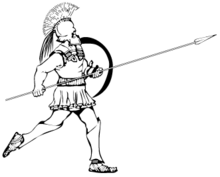Hoplology

Hoplology is a science that studies human combative behavior and performance. The word hoplology is derived from the Greek terms hoplos (a mythical plate-armored animal) and hoplite, the term for the classical Greek warrior. The field originates in the 19th century with the explorer and linguist Sir Richard Burton; although the origin of the word is often attributed to Burton, there are earlier references to it.[1] Despite the work of Burton and a few others, it was not until the 1960s that hoplology took shape as an academic field of study under the leadership of Donn F. Draeger.[1]
Founded by Major Donn F. Draeger (USMC Ret.) (1922-1982), the International Hoplology Society ("IHS") exists to study the evolution and development of human combative behavior. Draeger, drawing upon research and hands-on experience with classical fighting systems, defined hoplology by the 1970s as "the study of the basis, patterns, relationships, and significances of combative behavior at all levels of social complexity." (Draeger 1982) This study encompasses the segment of human culture concerned with weapons, armor, combative accouterments and fighting systems, in regard to their technical characteristics and the ways in which they interact with the economic, political, social and religious institutions of human societies. Draeger's student and colleague, Hunter B. Armstrong, carries on the hoplological tradition as director of IHS. Hunter B. Armstrong is a leading authority on combative behavior and performance. He has trained in numerous Asian and Western martial arts from a young age. He has spent a lifetime studying hoplology and related areas, including functional conditioning for combat. He currently trains military and law enforcement around the world in these areas.
Hunter B. Armstrong works closely with military and law enforcement, and has been central to the most recent recreation of the Marine Corps Martial Arts Program (MCMAP) program.
In recent years, with the advent of the Modern Army Combatives (MAC) Program in the US Army and the Marine Corps Martial Arts Program (MCMAP), there has been a rapid growth in both scientific and academic research.
With Matt Larsen, the father of the MAC program, as a catalyst, research departments are growing at universities across the United States. One of the first such programs was at Kansas State University; the program is currently defunct.[2]
While hoplology is still in its infancy, it has become an accepted area of study by scholars in several related disciplines such as combative psychology, killology, anthropology, and military history.
See also
References
- ^ a b Wiley, Mark V. "Hoplology and Combative Culture: Part 1". The International Hoplology Society. Retrieved 2009-03-07.
- ^ http://www.kstatecollegian.com/news/modern-combatives-program-cancelled-due-to-budget-concerns-1.2165227
- Draeger, Donn F. (1979). An Introduction to Hoplology: Part I of II, Hoplos 1:1
- Draeger, Donn F. (1979). An Introduction to Hoplology: Part II of II, Hoplos 1:2
- Draeger, Donn F. (1982). The Hoplological Glossary, Hoplos 4:1
